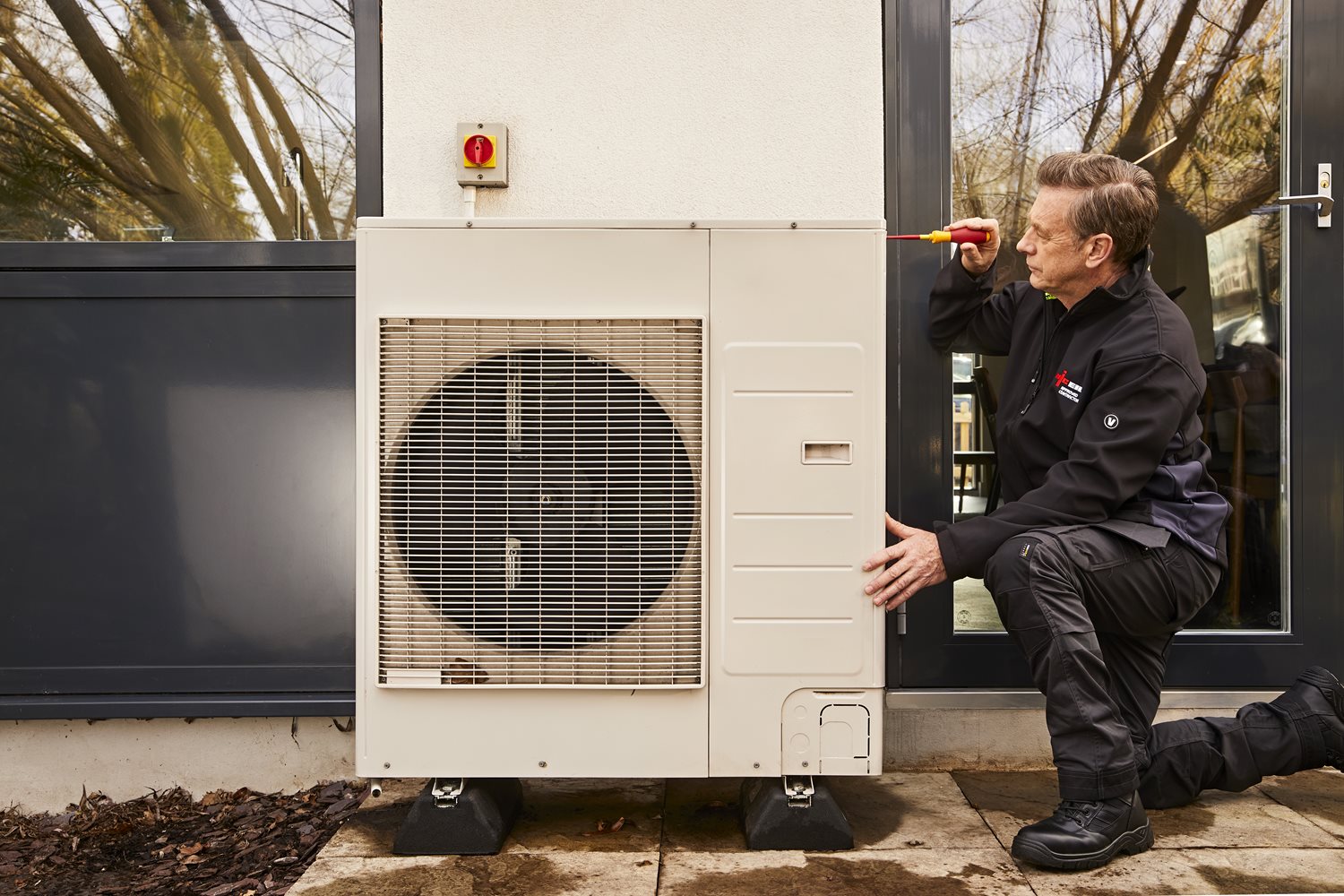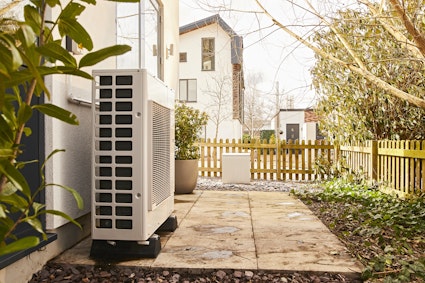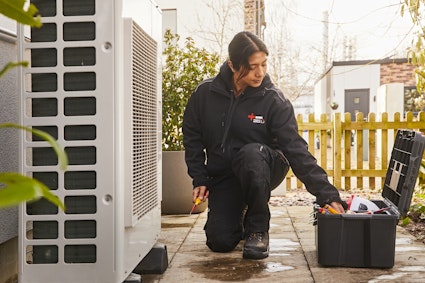Keeping energy costs down, and your house warm, can be tricky with a conventional boiler. That’s why thousands of families have made the switch from boilers in recent years, choosing instead to install a heat pump in their homes.
In 2024, the UK reached the impressive milestone of 250,000 certified heat pump installations, according to data from the Microgeneration Certification Scheme (MCS), with well over 98,000 heat pumps sold in 2024 alone – a 63% increase on the previous year.
But with the 2021 Net Zero Strategy targeting 600,000 heat pump installations per year by 2028 and the government’s Boiler Upgrade Scheme offering grants of up to £7,500 to households installing a heat pump, the market is set for significant growth.
If you’re interested in getting a heat pump for your home, then this article is for you. We’ll take you through everything you need to know about heat pump installation, so you can make an informed decision about whether installing a heat pump might be right for you and your property.

First off - what is a heat pump
A heat pump is a more energy-efficient way of heating your home than a traditional gas boiler.
It takes heat from one environment (such as the air, a local water source or underground) and transfers it to another. So, it can transfer heat from outside into your home on a cold day, or push heat outside to keep your home cool in summer.
This could make installing a heat pump a great solution for householders looking for both heating and air conditioning to keep their home at a comfortable temperature year-round.
How does a heat pump differ from a traditional boiler?
Whereas a traditional boiler burns gas to generate heat, heat pumps, as we have seen, draw heat from the environment to provide you with heating and hot water. This makes them much more efficient as they are not creating heat, simply transferring existing heat elsewhere.
Gas boilers provide heat quickly, meaning it takes less time to heat up your home. Usually heating to temperatures of between 60°C to 80°C (depending on their age and efficiency), gas boilers work well with high-temperature radiators.
Heat pumps, meanwhile, provide a lower, steadier supply of heat (between 35°C and 55°C). Because of this lower temperature, they work best with heat emitters with a larger surface area, such as large radiators and underfloor heating. For optimum functionality, your home also needs to be well insulated to avoid losing any heat.
What are the different types of heat pumps?
There are three main types of heat pumps, each providing its own unique benefits and being better suited to certain homes.
These types of heat pumps include:
Air source heat pumps (ASHPs) – the most common type of domestic heat pump, these absorb heat from the air outside (even in cold weather).
Air source heat pumps can be divided into two categories – air-to-water and air-to-air heat pumps.
Air-to-water heat pumps - Air-to-water heat pumps are the most common type of heat pumps installed in UK homes today. They work by taking warmth from the air outside and using it to heat water, which is then distributed via your ‘wet’ heating system. This essentially means a system that uses hot water to warm your home by flowing it through radiators or underfloor pipes.
The main benefit of an air-to-water heat pump is that these devices will heat both your home and your water.
Air-to-air heat pumps - Air-to-air heat pumps, on the other hand, heat the air in your home and don’t rely on hot water. Although less common than their air-to-water counterparts, there are a few distinct benefits to an air-to-air heat pump:
- You don’t need a wet heating system in your home.
- With smaller outdoor units, they can be more suitable for smaller homes and flats than air-to-water heat pumps.
- They can be cheaper to install than their air-to-water counterparts, particularly where the latter would require the installation of extensive ductwork or underfloor heating.
- The heating effect can be reversed to push hot air outside in the summer, offering a heating and air conditioning system all in one.
They won’t typically heat your water, however, so you’ll likely need to explore alternative options.
Ground source heat pumps (GSHPs) – these extract heat from the ground via underground pipes. They do require a fair bit more space – you’ll need an area of land that’s suitable for digging and accessible for machinery or boreholes.
Water source heat pumps (WSHPs) – these extract heat from a body of water, like a lake or river, and transfer it into your home.

Should I get a heat pump installed in my home?
It completely depends on your situation and your home’s current heating system. For example, if you have a new build home with a new, energy-efficient gas boiler, it’s probably not worth switching over to a heat pump – at least, not yet. On the other hand, if you have an old, inefficient heating system or are looking to do your bit to support the environment, then installing a heat pump could be right for you.
In this section, we’ll run you through some of the pros and cons of heat pump installation, helping you make an informed decision.
Advantages of heat pump installation
Energy efficiency: heat pumps operate at three to four times the efficiency of a traditional gas boiler.
Lower carbon emissions: because they don’t burn fossil fuels to produce heat, heat pumps produce far fewer CO2 emissions – especially when powered by renewable electricity.
Long-term savings: although the upfront costs of installing a heat pump are higher than for more traditional systems, the affordable running costs mean you can save more money over time – especially if you’re replacing old-fashioned oil or electric heating.
Low maintenance: a well-installed heat pump will typically last longer and need less maintenance than traditional heating systems – a quick, straightforward annual visit from a professional heat pump technician is usually all that’s required.
Government incentives: the Boiler Upgrade Scheme is available to homeowners in England and Wales is currently set to end in 2028. Eligible households can get up to £7,500 off the cost of installing a low carbon heating system, making it much more cost-effective. If you live in Scotland, grants are available via the Home Energy Scotland Grant and Loan Scheme.
Potential challenges of heat pumps
- High upfront costs: despite the cost savings available from the Boiler Upgrade Scheme, initial installation of a heat pump can still be costly – especially when it comes to ground source heat pumps, which require digging and/or landscaping.
- Lower efficiency in colder weather: air source heat pumps may struggle in very cold climates, although newer models are improving in this area. Ground source heat pumps tend to be more stable in cold weather, as they extract heat from deep underground.
- Home upgrades may be required: heat pumps work best in well-insulated homes, so home upgrades like additional insulation and new radiators might also be needed to make the most of a heat pump.
- Installation can be disruptive: this is especially the case for ground source systems, which involve digging trenches or boreholes. Even air source systems might require changes to your pipework.
- Space requirements: you’ll need space outside for the pump unit and possibly a hot water cylinder inside, depending on the type of heat pump. This may make them unsuitable for smaller homes.
Heat pump costs
Now for the question we can hear everyone asking: how much does a heat pump actually cost to install?
Well, it’s a difficult one to answer, with so many variables involved in the equation. Factors involved in the cost of installing a heat pump include:
- the heat pump type and model
- the size of your property
- the installer you go with
- whether there are any upgrades required to your home, such as radiators or insulation.
However, the Energy Saving Trust does give some ballpark figures for the different types of heat pump.
- Air source heat pump costs: according to the Energy Saving Trust, the average cost of an air source heat pump is around £11,000.
- Ground source heat pump costs: according to the Energy Saving Trust, a ground source heat pump costs around £29,000 to install – although this can rise to £57,000 if boreholes are needed.
The best way to understand what heat pump installation will cost for your home and circumstances is to contact several trusted tradespeople for a quote. NICEIC’s Find a Trusted Tradesperson tool allows you to submit your heat pump job to NICEIC-registered electricians and heat pump technicians in your area, who will be able to give you a better idea of the cost of installing a heat pump in your particular property.
Heat pump savings
Given the high cost of installing a heat pump, you might be wondering what you can stand to save in energy costs by switching to a heat pump system.
Well, again, it depends on a range of factors, including the type of system you already have, the size of your property, and your electricity tariff. To help you understand roughly what you could save, we’ve borrowed some calculations from the Energy Saving Trust, which are based on fuel prices in July 2025.
- If your heat pump is replacing electric storage heaters, you could stand to save between £700 to £1,200 per year, depending on the heaters’ age and condition.
- If you’re replacing an LPG boiler, you could save between £200 and £700 per year, again depending on the boiler’s age and energy efficiency rating.
- Meanwhile, those replacing old gas or oil boilers could save between £65 and £260.
- However, if you have a new gas or oil boiler that’s relatively efficient, you may spend more per year on running a heat pump – this is because of the high cost of electricity in the UK relative to oil and natural gas.

So, is it worth getting a heat pump in the UK?
Weighing up all the pros and cons of heat pump installation can be tricky, as there are lots of variables to consider.
To help you with your decision-making, we’ve listed some particular situations where getting a heat pump might make sense.
- Your home is already well insulated: heat pumps work best in homes that are already energy efficient. If your home is already well insulated, it’ll keep your costs down and you’ll derive maximum benefit from your heat pump.
- You’re replacing an LPG, oil, or electric heating system: heat pumps will deliver the most significant cost savings for households using old-fashioned liquefied petroleum gas (LPG), oil, or electric heating systems.
- You’ve found your forever home: given the high upfront cost of installing a heat pump, it’s best to install one in a home you’re going to be staying in for a long time. You’ll make back the money over the years in lower energy bills – but it won’t happen overnight.
- You’re already renovating: if you’re already doing up your home, this might be a good time to upgrade your pipework, radiators, and insulation to get your property heat pump-ready.
- You’re sustainability conscious: if you want to cut your carbon footprint, heat pumps are one of the greenest heating options available – especially when they’re powered with green electricity.
However, there may be some situations where you might want to wait a little longer before installing a heat pump, for example:
- Your home is draughty or poorly insulated: you’ll likely need to invest in insulation, double glazing or even underfloor heating to get the full benefit – which can be costly.
- You have a new, energy-efficient boiler: if you live in a new build home with a brand spanking new boiler, for example, it doesn’t really make sense to get a heat pump installed just yet.
- You live in a very cold climate: as we’ve mentioned previously in this article, air source heat pumps can struggle in very cold climates – although this is improving with newer models and hybrid systems.
- You have no outdoor space: air source heat pump units (particularly air-to-water models) can take up a fair bit of outside space, while ground source heat pumps require a lot more space for the trenches or boreholes.
Choosing the right heat pump installer
With any home repair or upgrade, you want the very best person for the job – for example, a registered heat pump engineer certified on NICEIC’s MCS Approved Contractor Scheme. The Microgeneration Certification Scheme (MCS) is the UK’s leading standards body for the renewable energy sector.
This means they are regularly assessed against the latest industry standards for these renewable technologies, and deemed competent to carry out safe, quality, and compliant installations.
With the NICEIC Find a Trusted Tradesperson tool, it’s never been simpler to find a reputable heat pump installer.
Absolutely – it’s definitely not a DIY job! An NICEIC electrician who is registered on our MCS Scheme will have the knowledge and skills to safely install a heat pump in your property that’s compliant with all the latest standards and guidelines.
Depending on the type of heat pump, it can take between a few days to a week to install one. Air source heat pumps will typically take between one and two days to install, while digging trenches or boreholes for ground source heat pumps can take anywhere between three to four days and a week.
No, you don’t usually need to secure planning permission to install a heat pump (unless you live in a listed building or conservation area). This is because in most cases, such installations fall under permitted development rights.
However, you do need to notify your Local Authority Building Control before installing a heat pump. Although you can do this yourself, it’s much easier (and cheaper) to simply hire a heat pump engineer registered on a competent person scheme (CPS) such as NICEIC’s. These professionals are deemed competent to self-certify that their work meets building regulations requirements. It’s often less expensive and a lot less effort than doing it yourself!
If you’re unsure at all, you can check with your local council or with your chosen heat pump installer.
Whether or not you’ll save money by installing a heat pump completely depends on your existing heating system, current fuel prices, the cost of heat pump installation, your property’s level of insulation, and many other factors.
If you’re replacing an old electric heating system or an LPG boiler, you could save hundreds of pounds every year. However, if you have a new, energy efficient gas boiler, you may actually spend more on running a heat pump due to current high electricity costs in the UK.
The costs of running a heat pump depend on a wide range of factors, including your energy tariff, the model of your heat pump, the size and insultation of your property, and your own heating habits.
According to EON Energy, running an air source heat pump can cost around £450 - £1,200 annually, while the Energy Saving Trust estimates an annual cost of around £1,540 per year. Clearly, however, the wide disparities in these estimates show just how dependent heat pump running costs are on the variables mentioned above.
A well-installed heat pump will require relatively little maintenance. Each heat pump manufacturer will recommend an optimum service and maintenance schedule for that particular model; typically, this will be an annual service with a heat pump engineer who is qualified to maintain and repair these systems.
Heat pumps are long lasting, with typical estimates of their lifespan ranging between 20 and 25 years. By keeping your heat pump well maintained, you’ll help extend its lifespan and hopefully enjoy even more cost savings in the future.
All information shared is correct as of September 2025.
